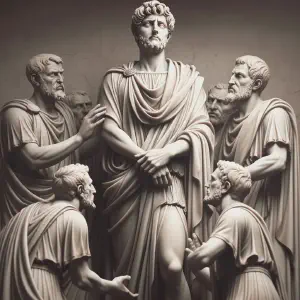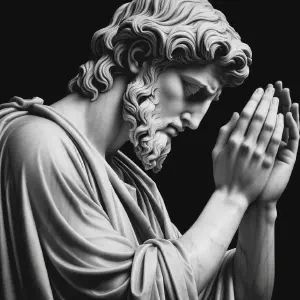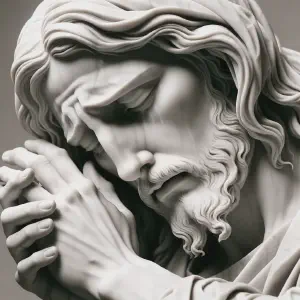The Zeal of Mattathias



In a poignant parallel, the Gospel recounts Jesus’ approach to Jerusalem. His heart heavy with sorrow, Jesus wept for the city, lamenting its impending devastation and the blindness of its inhabitants to the ways of peace. He foresaw the dire consequences of their failure to recognize the time of divine visitation. This lamentation echoed the sentiments of the Psalm, calling the faithful to offer true sacrifices of praise and to seek God in times of distress. Both narratives, separated by centuries, speak to the enduring theme of steadfast faith and the consequences of turning away from divine truth.
Five Questions
What is the significance of Mattathias’ refusal to comply with the king’s decree in the story from 1 Maccabees?
Mattathias’ refusal to obey the king’s decree is a powerful testament to his faith and commitment to the covenant with God. It represents a crucial moment of choice where he prioritizes spiritual integrity over worldly gain or safety. His decision not only marks a personal stand against idolatry and apostasy but also sets a precedent for others to follow, demonstrating the importance of staying true to one’s beliefs even in the face of severe pressure and potential consequences.
How does Mattathias’ action compare to the zeal of Phinehas mentioned in the story?
Mattathias’ actions mirror the zeal of Phinehas, as recorded in the Hebrew Scriptures, where Phinehas took dramatic action to defend the covenant and stop a plague among the Israelites. Both instances reflect a profound zeal for the law of God, where decisive, even violent, action is taken to uphold religious principles. These actions, driven by fervor for God’s law, highlight the importance of defending the faith and the community’s spiritual wellbeing, even when it means taking drastic measures.
In Psalm 50, what does the phrase ‘offer to God praise as your sacrifice’ signify in relation to the story of Mattathias?
In Psalm 50, the phrase ‘offer to God praise as your sacrifice’ emphasizes the importance of spiritual sacrifices over physical ones. In the context of Mattathias’ story, it suggests that true devotion to God involves more than just ritualistic observances; it requires a genuine commitment of the heart and soul. By rejecting the pagan sacrifices and choosing to uphold the covenant, Mattathias and his followers embody this principle, offering their lives as a living sacrifice to God through their actions and unwavering faith.
How does the Gospel of Luke’s account of Jesus weeping over Jerusalem relate to the themes in the Maccabees story?
In the Gospel of Luke, Jesus weeps over Jerusalem because the people failed to recognize the time of their visitation by God and the path to peace. This connects to the Maccabees story as both involve themes of recognizing and responding correctly to God’s will. While Mattathias responds to God’s law with zealous action, Jerusalem fails to recognize Jesus as the fulfillment of God’s promises. Both passages highlight the consequences of the choices people make in response to divine truth.
What overarching message do these scriptures convey about faith and action?
These scriptures collectively convey that true faith is not passive but requires active response and commitment. Mattathias’ story illustrates the need for courageous action in defense of one’s beliefs, while Psalm 50 advocates for spiritual sacrifices of praise and devotion. The Gospel of Luke further emphasizes the importance of recognizing and acting upon divine truth. Together, these scriptures teach that faith involves a dynamic engagement with God’s will, calling for both inner devotion and outward action in the world.
Bible Study
1 Maccabees 2:15-29
The officers of the king in charge of enforcing the apostasy
came to the city of Modein to organize the sacrifices.
Many of Israel joined them,
but Mattathias and his sons gathered in a group apart.
Then the officers of the king addressed Mattathias:
“You are a leader, an honorable and great man in this city,
supported by sons and kin.
Come now, be the first to obey the king’s command,
as all the Gentiles and the men of Judah
and those who are left in Jerusalem have done.
Then you and your sons shall be numbered among the King’s Friends,
and shall be enriched with silver and gold and many gifts.”
But Mattathias answered in a loud voice:
“Although all the Gentiles in the king’s realm obey him,
so that each forsakes the religion of his fathers
and consents to the king’s orders,
yet I and my sons and my kin
will keep to the covenant of our fathers.
God forbid that we should forsake the law and the commandments.
We will not obey the words of the king
nor depart from our religion in the slightest degree.”
As he finished saying these words,
a certain Jew came forward in the sight of all
to offer sacrifice on the altar in Modein
according to the king’s order.
When Mattathias saw him, he was filled with zeal;
his heart was moved and his just fury was aroused;
he sprang forward and killed him upon the altar.
At the same time, he also killed the messenger of the king
who was forcing them to sacrifice,
and he tore down the altar.
Thus he showed his zeal for the law,
just as Phinehas did with Zimri, son of Salu.
Then Mattathias went through the city shouting,
“Let everyone who is zealous for the law
and who stands by the covenant follow after me!”
Thereupon he fled to the mountains with his sons,
leaving behind in the city all their possessions.
Many who sought to live according to righteousness and religious custom
went out into the desert to settle there.
This passage from 1 Maccabees depicts Mattathias, a Jewish priest, as a central character who defies the king’s decree to perform pagan sacrifices. Mattathias’s refusal to forsake the covenant of his fathers aligns with Catholic values of fidelity to God’s commandments and resistance to idolatry. His zealous actions, which include killing a fellow Jew and the king’s messenger, underscore a drastic commitment to faith. This narrative resonates with the Catholic emphasis on the sanctity of religious traditions and the willingness to resist unjust authority, though the violence depicted is interpreted more as a historical response than a prescriptive action.
Psalm 50:1b-2, 5-6, 14-15
R. (23b) To the upright I will show the saving power of God.
God the LORD has spoken and summoned the earth,
from the rising of the sun to its setting.
From Zion, perfect in beauty,
God shines forth.
R. To the upright I will show the saving power of God.
“Gather my faithful ones before me,
those who have made a covenant with me by sacrifice.”
And the heavens proclaim his justice;
for God himself is the judge.
R. To the upright I will show the saving power of God.
“Offer to God praise as your sacrifice
and fulfill your vows to the Most High;
Then call upon me in time of distress;
I will rescue you, and you shall glorify me.”
R. To the upright I will show the saving power of God.
Psalm 50 calls for genuine worship and faithfulness to God, emphasizing the importance of spiritual sacrifices over mere ritualistic observance. The psalmist, traditionally believed to be David, portrays God as the supreme judge who values integrity and true devotion. This aligns with Catholic teachings on the necessity of sincere repentance and worship, as articulated in the Catechism of the Catholic Church. The emphasis on fulfilling vows and calling upon God in times of distress echoes Catholic values of trust in divine mercy and the importance of prayerful communion with God.
Luke 19:41-44
As Jesus drew near Jerusalem,
he saw the city and wept over it, saying,
“If this day you only knew what makes for peace–
but now it is hidden from your eyes.
For the days are coming upon you
when your enemies will raise a palisade against you;
they will encircle you and hem you in on all sides.
They will smash you to the ground and your children within you,
and they will not leave one stone upon another within you
because you did not recognize the time of your visitation.”
In this passage from the Gospel of Luke, Jesus, the central figure of Christianity, laments over Jerusalem’s impending destruction due to its inhabitants’ failure to recognize their visitation by God. This reflects a key Catholic belief in Jesus as the fulfillment of God’s promises and the necessity of recognizing and accepting divine grace. Jesus’ sorrow over Jerusalem’s blindness to peace and his prophecy of its destruction align with Catholic teachings on the consequences of rejecting God’s grace and the importance of discerning and following God’s will for true peace and salvation.
Lessons
The readings collectively teach the importance of unwavering faith and steadfastness in the face of trials and temptations. Mattathias’ refusal to succumb to the lures of temporal power and his zealous defense of the faith exemplify the courage needed to uphold religious principles. The psalm echoes this sentiment, urging believers to offer true sacrifices of praise and seek God in times of distress. The Gospel of Luke, with Jesus lamenting over Jerusalem, serves as a somber reminder of the consequences of failing to recognize and embrace the ways of peace and divine truth. These passages together encourage us to remain faithful, resist temptation, and embrace a life of righteousness and devotion.
Meditation Prayer


